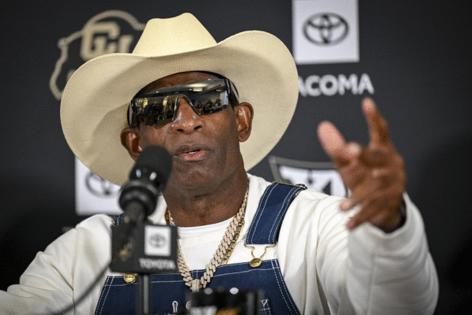Commentary: School coaches shouldn't be pushing religion
Published in Op Eds
As a former Division I football player and Team USA bobsledder who has gone on to become a state lawmaker in Oklahoma, I’ve seen it myself — coaches imposing their religious beliefs on players. This can involve pressuring players to engage in prayer or religious discussion, under threat of being sidelined.
Faith should be a personal choice. It should never be used as a test of team loyalty or buy-in. But in college sports, more and more coaches are crossing that line, pushing their personal religious beliefs onto players and shaping the culture of the team around it.
Take Deion “Coach Prime” Sanders, a prominent head football coach at the University of Colorado, who has repeatedly misused his position to proselytize to his players, urging them to “let God direct your path” and telling them “in Jesus’ name we pray.”
In response to the university’s 2023 warning about the unconstitutionality of proselytizing players as a state employee, Sanders stated at a public press conference last year, “Ain’t nobody going to tell me not to.” Since then, he has invited preachers to give prayer in the locker room and posted videos to Instagram of him or his assistant coach, Andre’ Hart, preaching to his players.
Other prominent coaches, including Hugh Freeze at Auburn, Spencer Danielson at Boise State, Dabo Swinney at Clemson and Dawn Staley at South Carolina, have also all wielded their personal religious beliefs in ways that coerce student-athletes to conform — a concern magnified in an era where student athletes stand to make, or lose, lucrative endorsement deals.
Now, I want to be clear: I will always defend the right of student athletes to hold personal religious beliefs. The same goes for Coach Sanders and other coaches. But faith stops being personal when it’s pushed upon students or subordinates by someone in a position of power, whether that is a head football coach or a politician.
At a public university like the University of Colorado, Sanders isn’t just a coach. He’s a state employee, and the First Amendment bars him from using that position to promote religion. His supporters point to the Supreme Court’s 2022 ruling in Kennedy v. Bremerton, but that case involved high school football coach Joseph Kennedy’s personal choice to pray on the field with students after games, as Kennedy was not leading or promoting religion to the rest of his team.
What we’re seeing in Sanders’ case is different: a head coach using his position to proselytize his religious beliefs onto players. That the players do not seem to object does not make it less exploitative. Religious coercion does not require explicit mandates. It works through an implied understanding that nonparticipation will mark you as an outsider.
I experienced this myself when I played football at Southern Methodist University from 2006 to 2011. Before games, the team held chapel sessions. Even though they were technically not mandatory, I knew every coach would be taking note of who showed up and who didn’t. I wanted to stay in their good graces, so I made sure to attend, even when I didn’t want to.
We also had pregame team meals where our head coach would call on a player at random to lead the group in prayer, which I remember feeling performative, not personal. It felt like players, including me, gave in to pressure to go along with what the coach wanted, even when our actual beliefs differed from his.
Most of these coaches probably have good intentions. They want to help student-athletes become better people. That is admirable, but good intentions do not excuse constitutional violations. Character development doesn’t require religious indoctrination. Let players decide on their own whether to pray or not pray.
Coaches should lead with strategy, discipline and character, not theology. Thankfully, this was my experience as an athlete on the United States Bobsled Team. Our coaches emphasized toughness, discipline, accountability, teamwork and perseverance. They led by example and didn’t need team prayer to inspire us. They built a team where athletes could compete without having to compromise their beliefs.
It’s time for coaches everywhere to adopt that approach.
____
Mickey Dollens of Oklahoma City is the regional government affairs manager at the Freedom From Religion Foundation and a member of the Oklahoma House of Representatives. This column was produced for Progressive Perspectives, a project of The Progressive magazine, and distributed by Tribune News Service.
_____
©2025 Tribune Content Agency, LLC.
























































Comments